How to Rank Your Marine Business Website 1st in Google
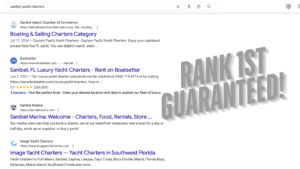
Why SEO Outperforms Other Marketing Channels for Marine Businesses
When it comes to marketing your marine business, opinions on the best approach vary. Some business owners swear by traditional advertising methods, while others have transitioned to digital. But after helping marine businesses scale for over a decade, one thing is clear:
Search engine optimization (SEO) is the most powerful strategy for long-term growth.
When someone needs a marine-related service—whether it’s a charter, marina, or boat repair—they head straight to Google. Ranking on the first page ensures you’re their first choice. Let’s explore why other marketing channels pale in comparison.
1.1 Paid Ads Are Expensive and Unsustainable
Pay-per-click (PPC) advertising can yield quick results, but it comes with a hefty price tag. For example, targeting “boat rental in Miami” could cost $8-$15 per click. If you’re running campaigns at scale, you’re likely spending thousands weekly—and that’s without guaranteeing bookings.
- CPC Inflation: CPCs in competitive industries increase by 10-20% annually, driving up costs further.
- Seasonality Impact: During peak seasons, CPCs can surge by up to 30%, further eating into ad budgets.
- Low Conversion Rates: Average conversion rates for PPC in travel and leisure hover around 3-5%.
- Click Fraud Costs: Up to 15% of PPC clicks are fraudulent, resulting in wasted spend.
- Unsustainable Margins: Without precise optimization, PPC campaigns can lead to negative ROI, especially for small businesses.
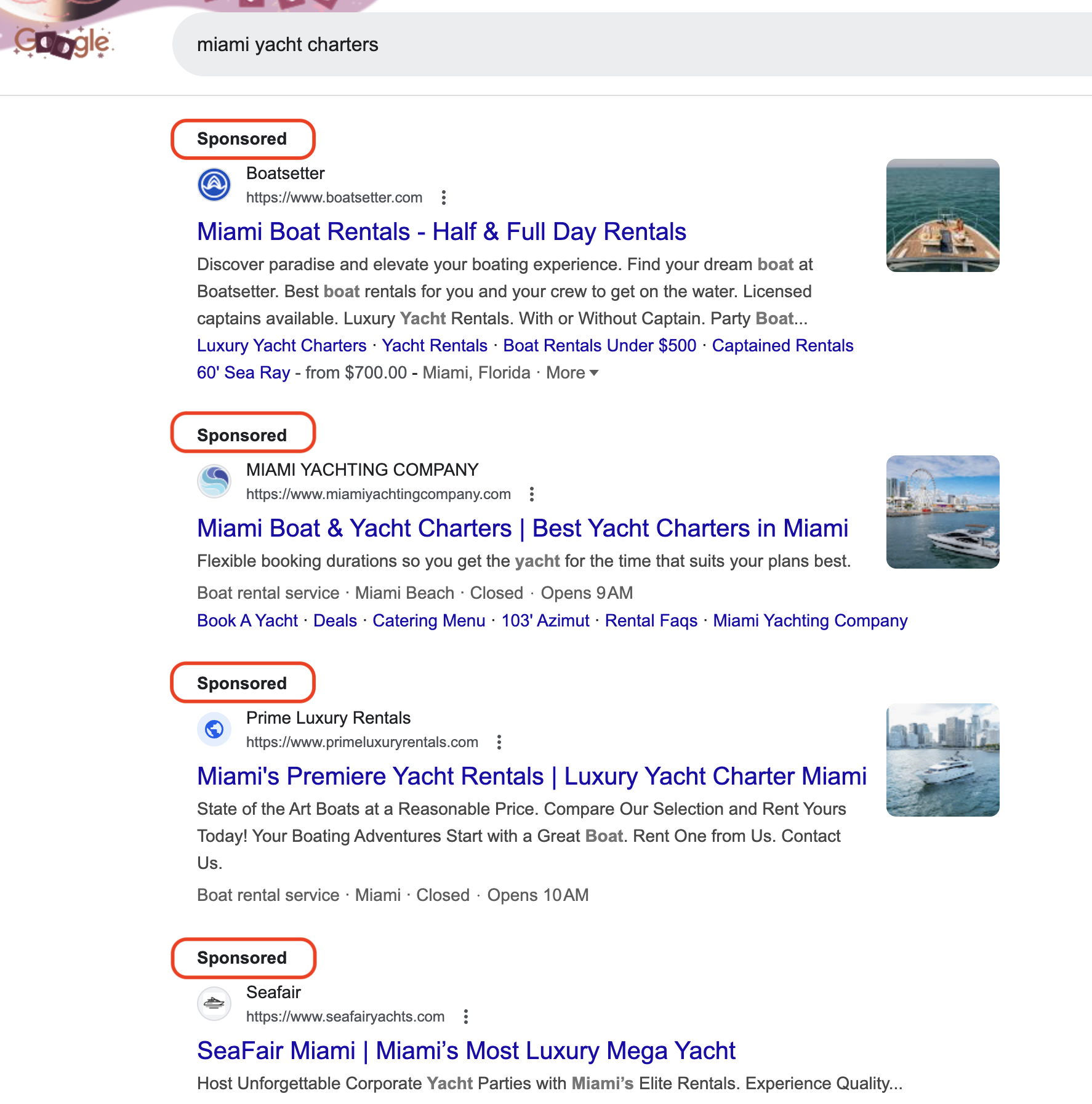
1.2 Social Media Ads Have Limited Conversions
Social platforms like Facebook and Instagram are fantastic for brand awareness, but they’re not the best for direct conversions. Most users scroll for entertainment, not to book a fishing charter or marina slip. While paid social ads might generate interest, conversion rates are often under 10%, making it an unreliable primary strategy.
- Platform Dependency: Changes in algorithms can drastically impact ad performance.
- Audience Intent: Social media users aren’t actively seeking services; they’re passively consuming content.
- High Bounce Rates: Many visitors from social media ads leave without engaging.
- Time-Intensive: Managing and optimizing social ads requires consistent effort.
- Limited Analytics: Compared to SEO, social platforms provide less granular data for targeting high-intent customers.
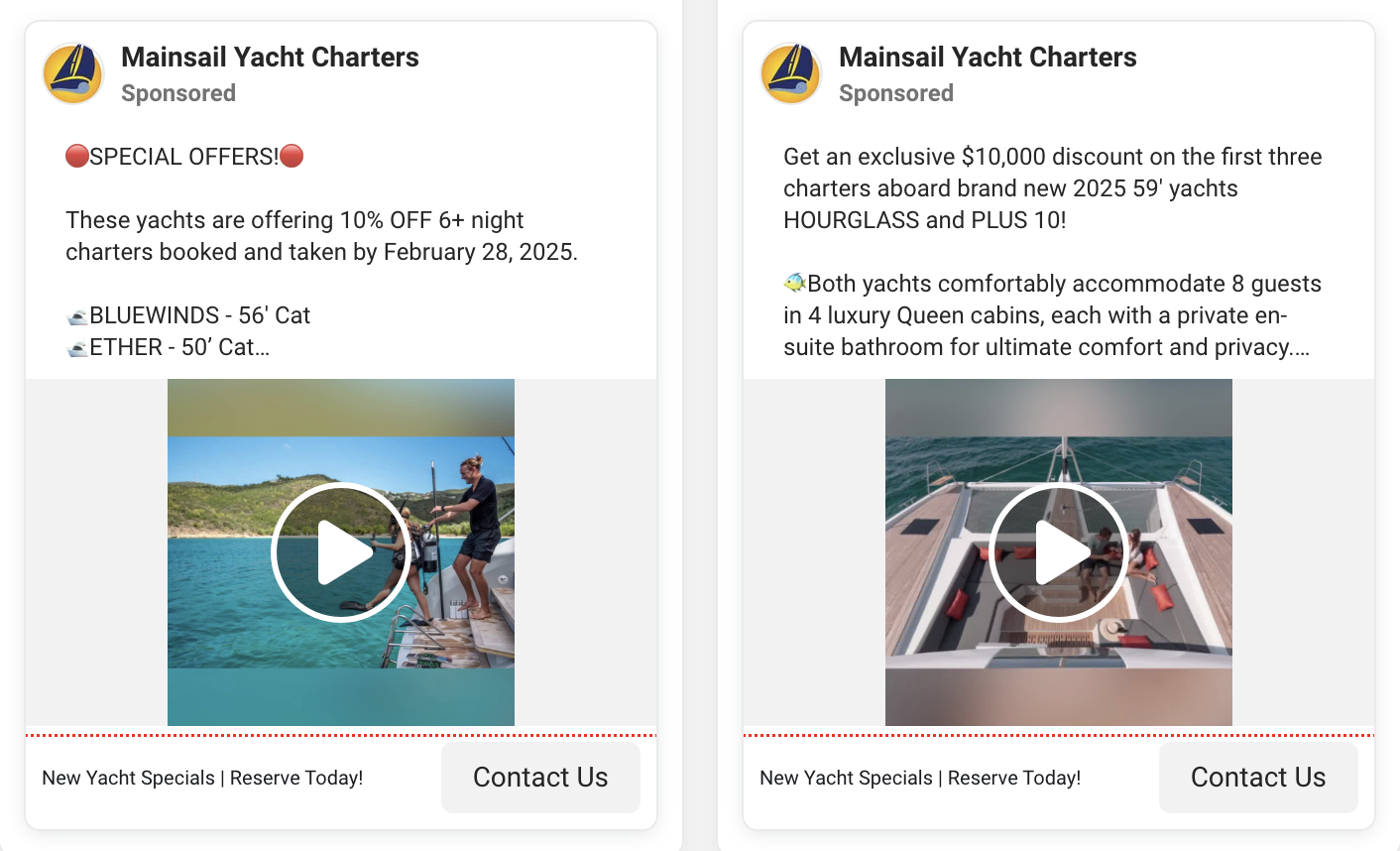
1.3 Traditional Marketing Fails to Target High-Intent Customers
Flyers, relevant/local magazine ads, and even local tourism maps/guides have been staples in the marine industry for years. However, they lack precision. Unlike SEO, traditional methods don’t capture customers actively searching for your services. This leads to wasted ad spend on low-intent audiences.
- Tracking Challenges: It’s difficult to measure the ROI of traditional advertising.
- High Costs: Billboard campaigns can cost $1,500 to $30,000 per month depending on location.
- Limited Reach: Most traditional ads only target local audiences and miss out on regional or international customers.
- Ineffective Messaging: Static ads fail to engage customers who need detailed information.
- Rapid Saturation: Traditional marketing lacks the adaptability and reach of digital strategies.
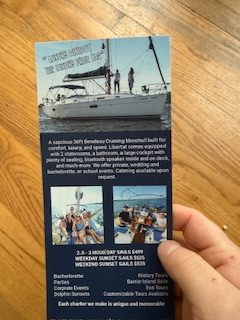
1.4 SEO Traffic Drives High Conversions and Sustained Growth
SEO is a long-term investment that continually pays off. By targeting high-intent keywords like “deep-sea fishing charters Key West,” your site can attract leads ready to book. Organic traffic also grows exponentially over time, creating a reliable revenue stream without the ongoing costs of PPC.
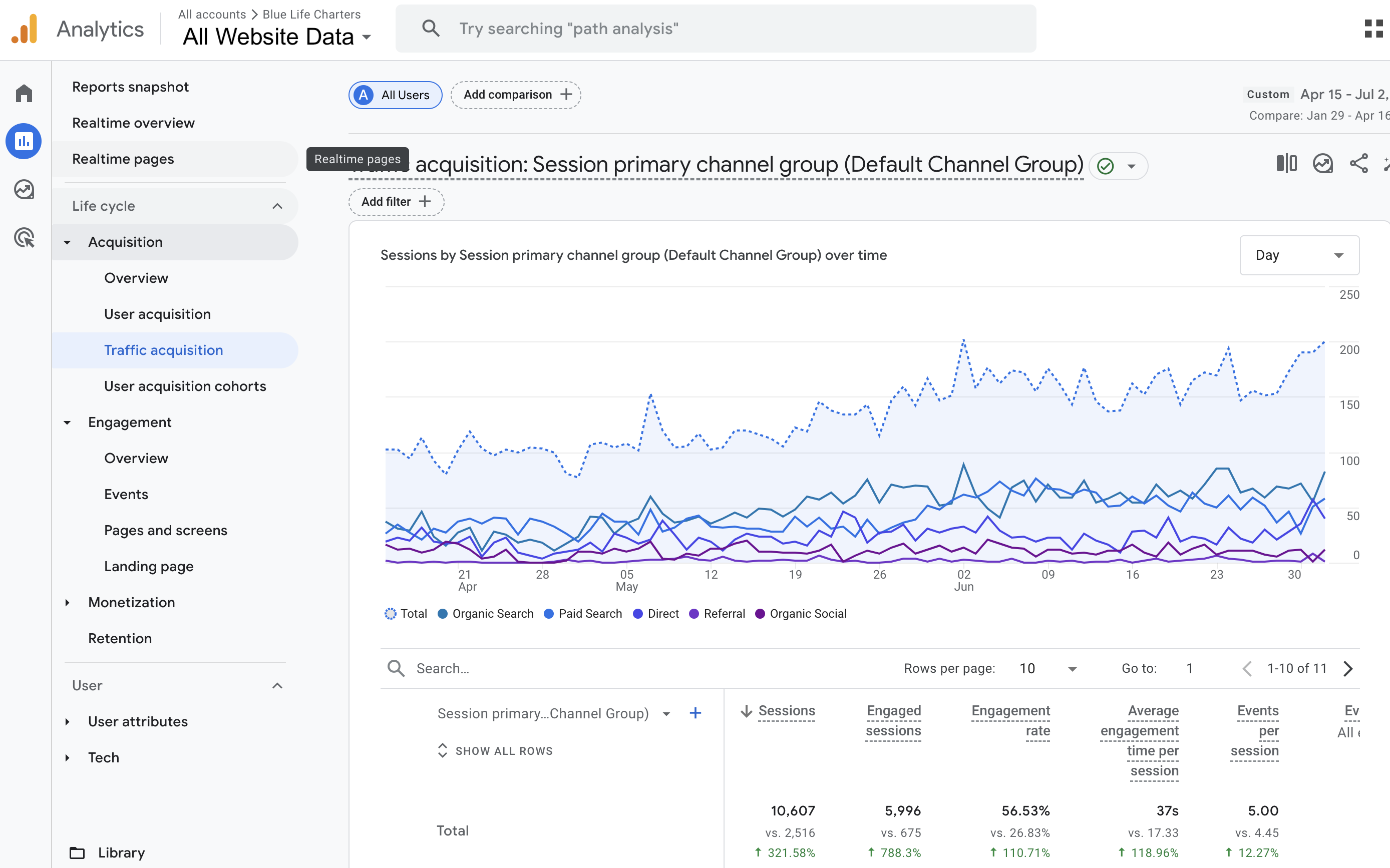
- Traffic Composition: Organic search drives 53% of web traffic, outperforming all other channels combined.
- Lower Cost Per Lead: Leads from organic search are 61% less expensive than paid leads.
- Compound Growth: SEO builds authority over time, delivering consistent traffic increases.
- User Trust: 75% of users ignore paid ads and prefer organic results.
- Sustained Visibility: Unlike ads that disappear after budget exhaustion, organic rankings persist.
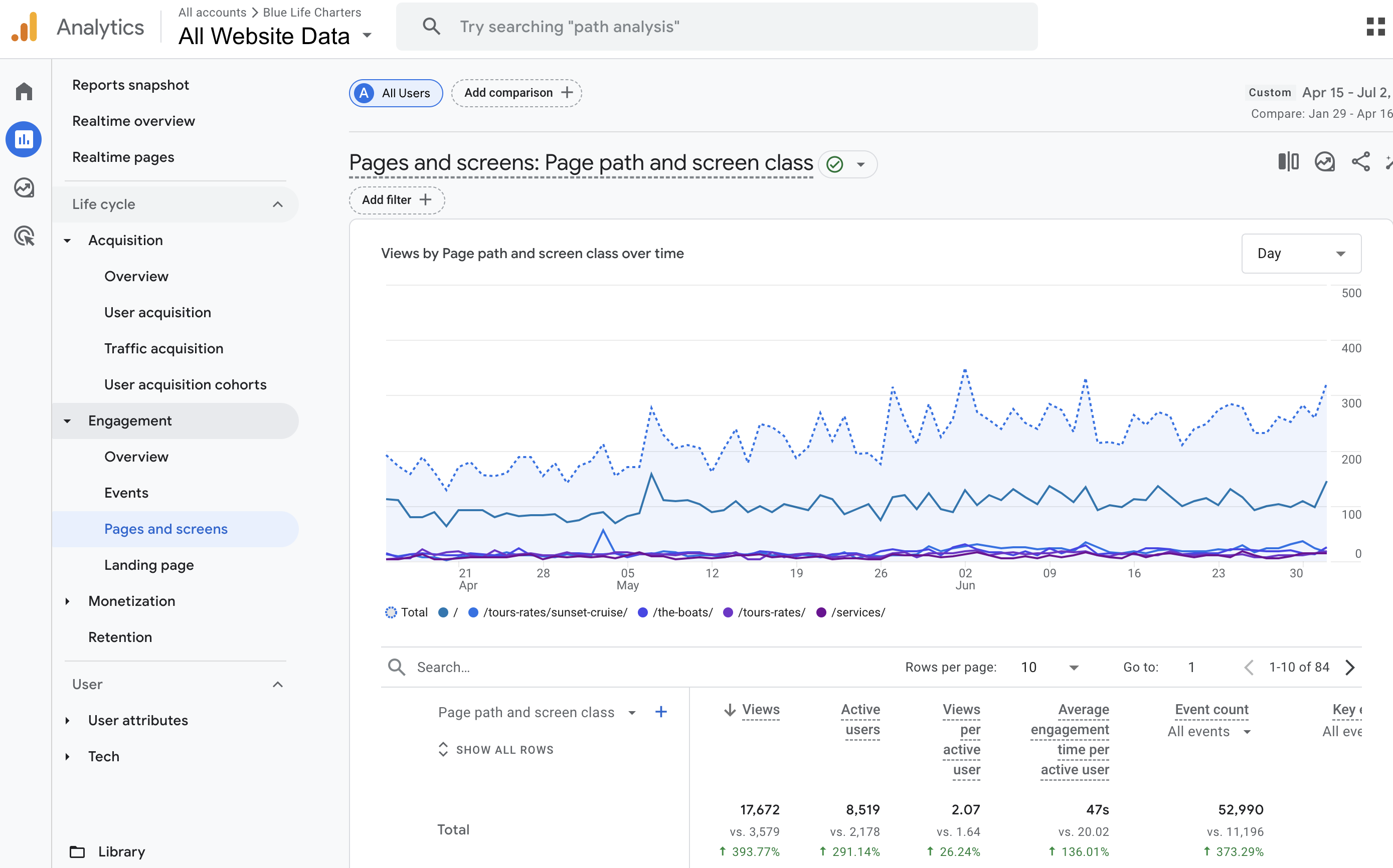
Essential Website Structure for Marine Industry Success
A well-structured website is the foundation of effective SEO. Google needs to understand your site’s content to rank it appropriately. Here are the must-have pages for a marine business website:
- Home Page: Clearly state who you are and what you offer.
- Services/Products Pages: Detail specific offerings like boat rentals, repair services, or fishing charters.
- About Us: Share your story to build trust.
- Contact Page: Make it easy for customers to reach you.
- Blog: Publish regular content to target informational searches.
- FAQs: Address common questions to reduce barriers to booking.
2.1 Why Site Structure Matters
Google’s crawlers rely on clear navigation and logical page hierarchy to understand and index your content. Without a user-friendly structure, even the best content can get lost. A well-organized site not only improves your rankings but also enhances the user experience, leading to higher engagement and conversions.
- Page Load Speed: Faster websites see a 50% lower bounce rate.
- Internal Linking: A well-linked site helps users and search engines navigate efficiently.
- Clear Navigation: Logical menus improve user engagement and reduce confusion.
- Mobile Optimization: With over 60% of searches from mobile devices, a responsive design is essential.
- Crawl Depth: Limit critical pages to three clicks from the homepage for better indexing.
Pro Tip: Use tools like Screaming Frog to audit your site’s structure and identify issues.
Optimizing Local Search for Marine Businesses
Local SEO is critical for marine businesses, as most customers search for nearby services. For example, when someone searches “boat repair near me,” you want your business to appear in the Google Maps Pack.
3.1 Optimize Your Google Business Profile
- Verify Your Address: Google will send a postcard to confirm your location.
- Collect Reviews: Positive reviews boost your profile’s visibility. Moz reports that review signals account for 15.44% of local ranking factors.
- Use Relevant Categories: Choose categories like “Marina” or “Boat Rental Service.”
- Keep Information Updated: Ensure hours, contact details, and photos are current.
- Geo-Targeted Keywords: Incorporate local phrases like “charter boats in Charleston” into your profile description.
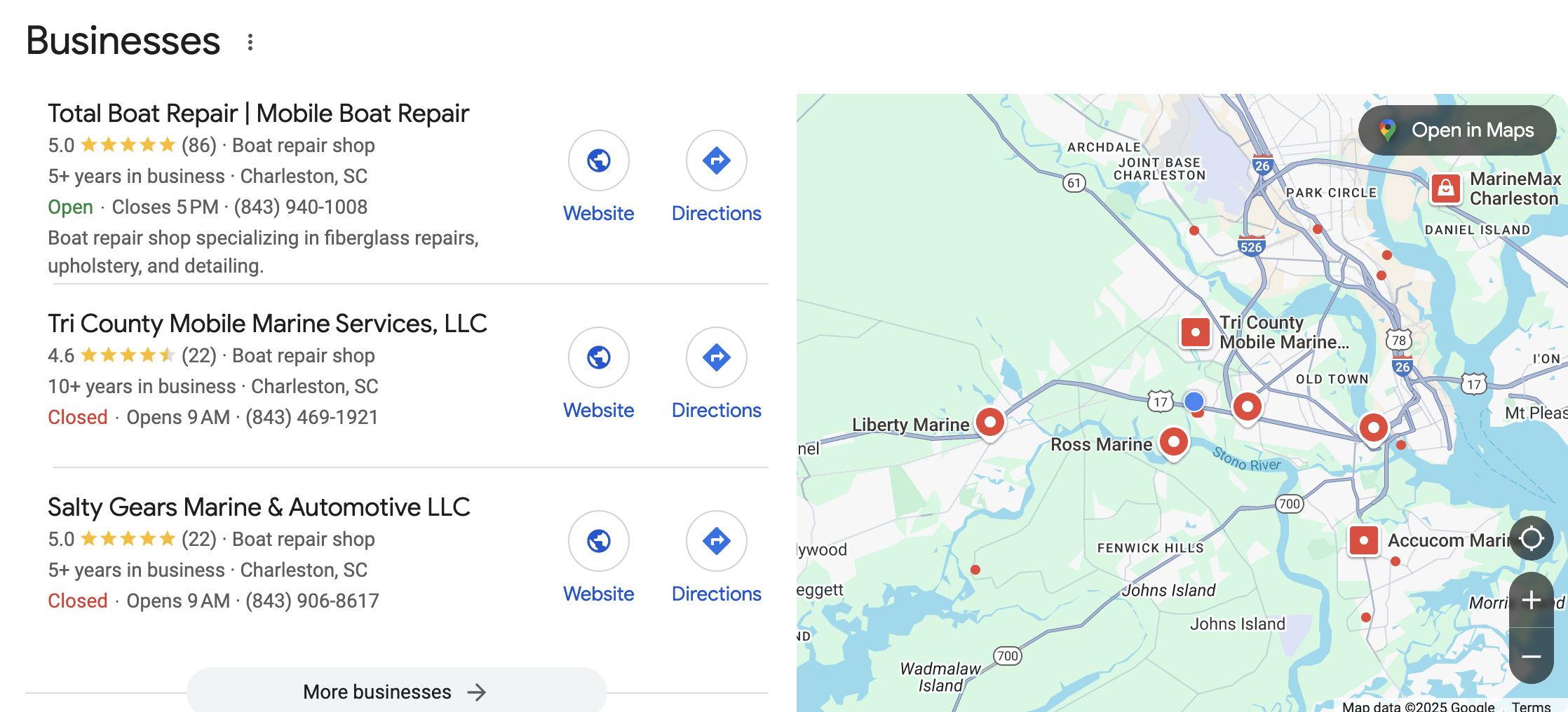
3.2 Build Local Citations
List your business in marine-specific and local directories like Yelp, TripAdvisor, and other relevant directories specific to the marine industry. These citations strengthen your local presence and improve rankings.
- NAP Consistency: Ensure your Name, Address, and Phone Number are identical across all listings.
- High-Quality Listings: Focus on directories with high domain authority.
- Customer Photos: Encourage users to upload photos, which improve engagement rates by 42%.
- Localized Links: Links from local websites signal relevance to Google.
- Review Management: Responding to reviews—positive or negative—builds trust with customers and Google.
Building Content That Engages and Converts
Content is the cornerstone of a successful SEO strategy. Informative, keyword-rich articles attract potential customers and establish your authority in the marine industry.
4.1 Top Content Ideas for Marine Businesses
- Educational Posts: “Top 5 Maintenance Tips for Your Boat”
- Destination Guides: “Best Fishing Spots in Charleston”
- Service How-Tos: “How to Choose the Right Charter for Your Family”
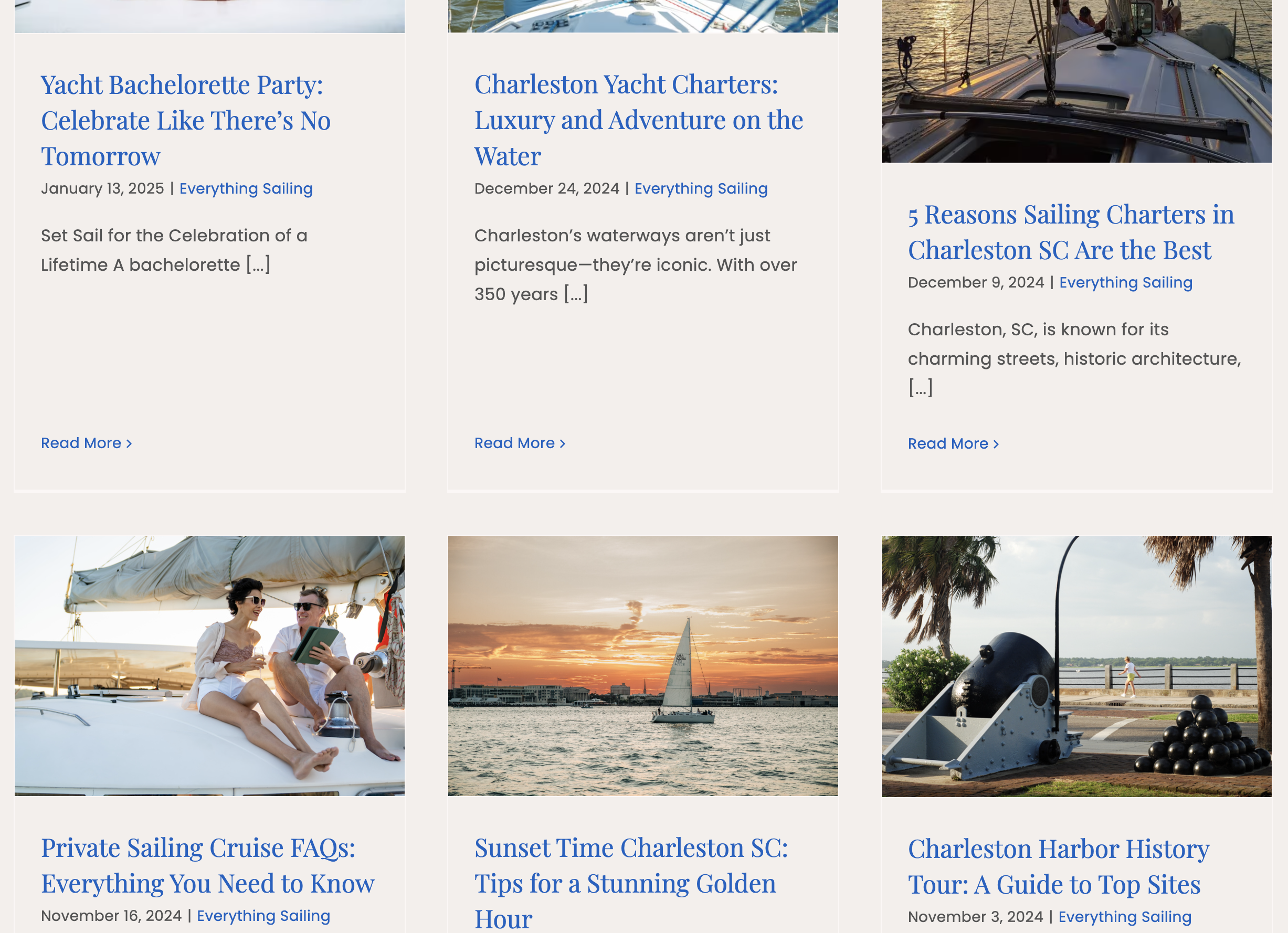
4.2 Create Content for Every Stage of the Funnel
- Awareness Stage: General topics like “10 Must-Have Accessories for New Boat Owners”
- Target high-volume keywords with low competition.
- Incorporate visuals like infographics for higher engagement.
- Use internal links to guide readers to relevant services.
- Consideration Stage: “How to Compare Boat Charters in Miami”
- Include comparison tables for clarity.
- Highlight unique selling points of your services.
- Add testimonials for credibility.
- Decision Stage: Service pages optimized for phrases like “book a private sunset cruise in Hilton Head.”
- Use clear CTAs like “Book Now” or “Reserve Today.”
- Incorporate live chat for instant customer support.
- Highlight limited-time offers to create urgency.
Content targeting each stage ensures you capture traffic at all points in the customer journey. HubSpot’s research shows that businesses publishing consistent, high-quality content see 3.5x more traffic and 4.5x more leads.
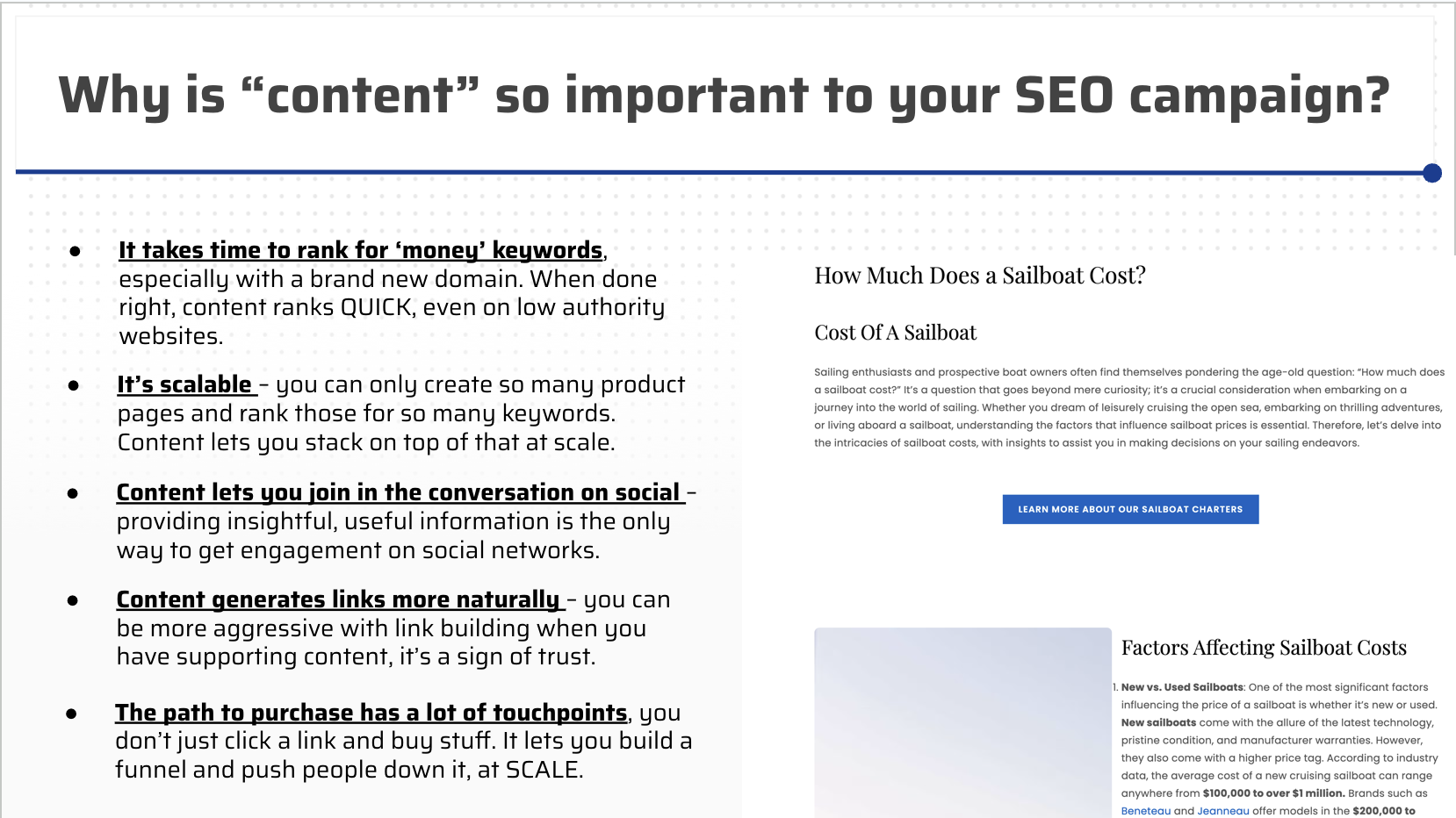
Mastering Backlinks for Authority and Trust
Backlinks—links from other websites to yours—signal to Google that your site is trustworthy. Here’s how to build quality backlinks:
- Local Partnerships: Collaborate with local tourism boards or marine organizations for mutual linking.
- Industry Blogs: Submit guest posts to reputable boating and marine blogs.
- Press Coverage: Use platforms like Qwoted to contribute to articles in exchange for links.
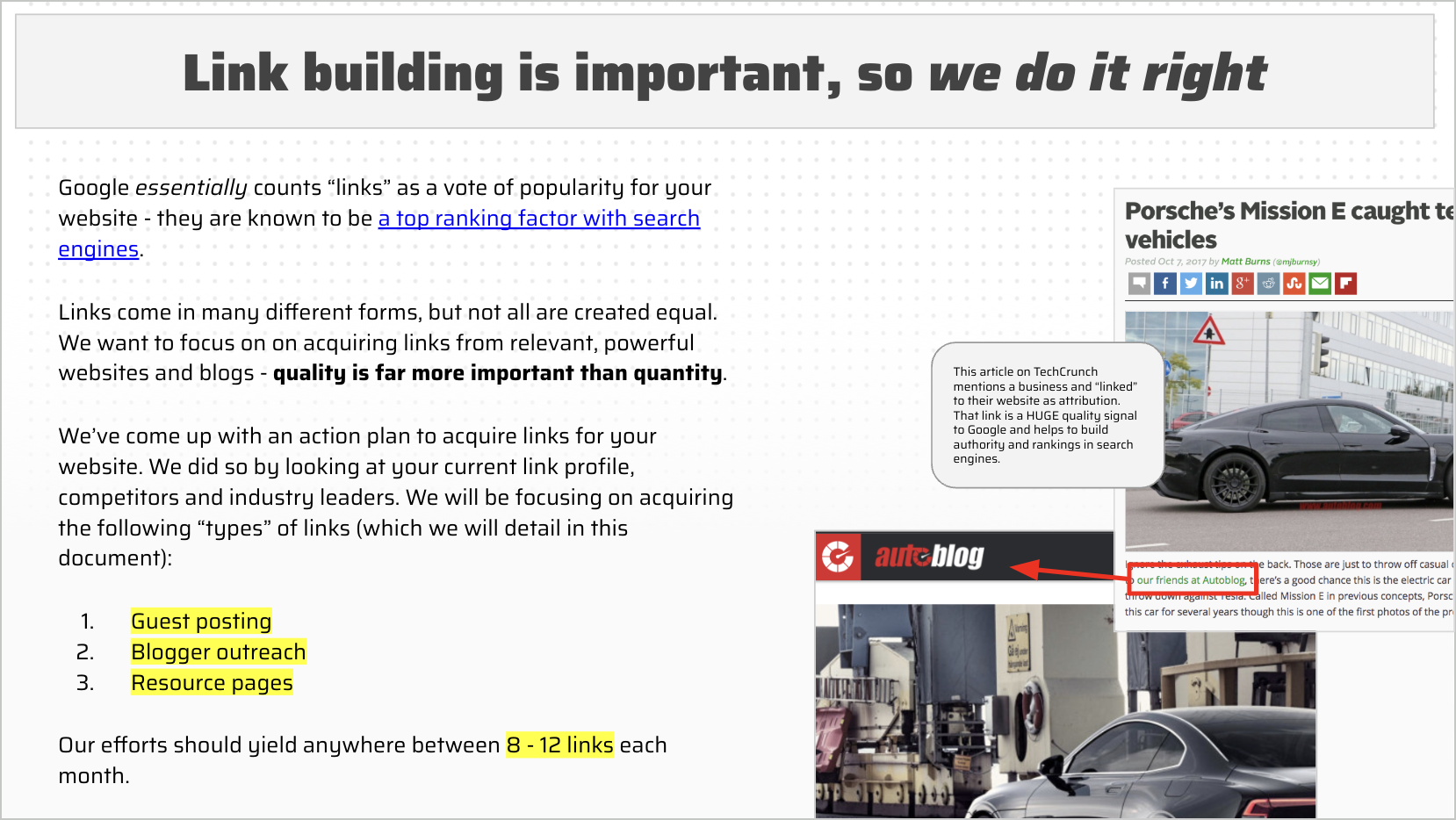
5.1 Quality Over Quantity
Not all backlinks are created equal. Links from high-authority sites in your industry carry more weight. For example, a link from BoatingMag.com is far more valuable than one from a low-traffic blog. Tools like Ahrefs or Moz can help you assess the quality of potential backlink sources.
- Anchor Text Optimization: Use relevant keywords in your anchor text for better ranking signals.
- Link Velocity: Build backlinks consistently to avoid sudden spikes that may trigger penalties.
- Broken Link Building: Identify broken links on high-authority sites and suggest your content as a replacement.
- Competitor Analysis: Use tools like SEMrush to uncover backlink opportunities.
- Social Shares: Promote your content on social media to attract natural backlinks.
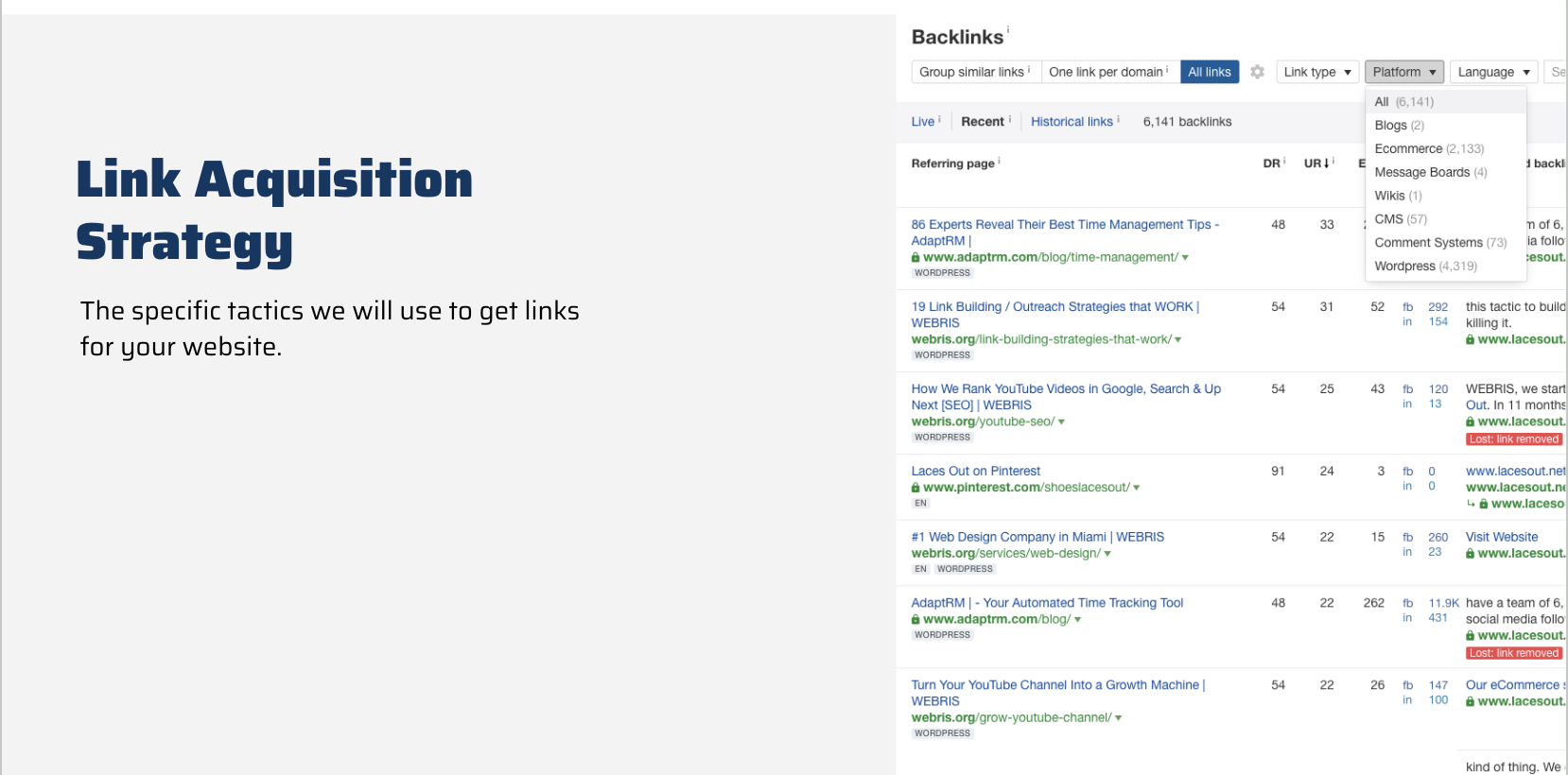
Advanced Technical SEO for Marine Websites
Beyond content and backlinks, technical SEO ensures your site is optimized for search engines and user experience. Here’s what to focus on:
- Schema Markup: Use structured data to enhance search visibility with rich snippets.
- SSL Certification: Secure your site with HTTPS to build trust and meet Google’s standards.
- Image Optimization: Compress images for faster load times without losing quality.
- Canonical Tags: Prevent duplicate content issues by specifying preferred URLs.
- XML Sitemaps: Submit sitemaps to Google Search Console to ensure full site indexing.
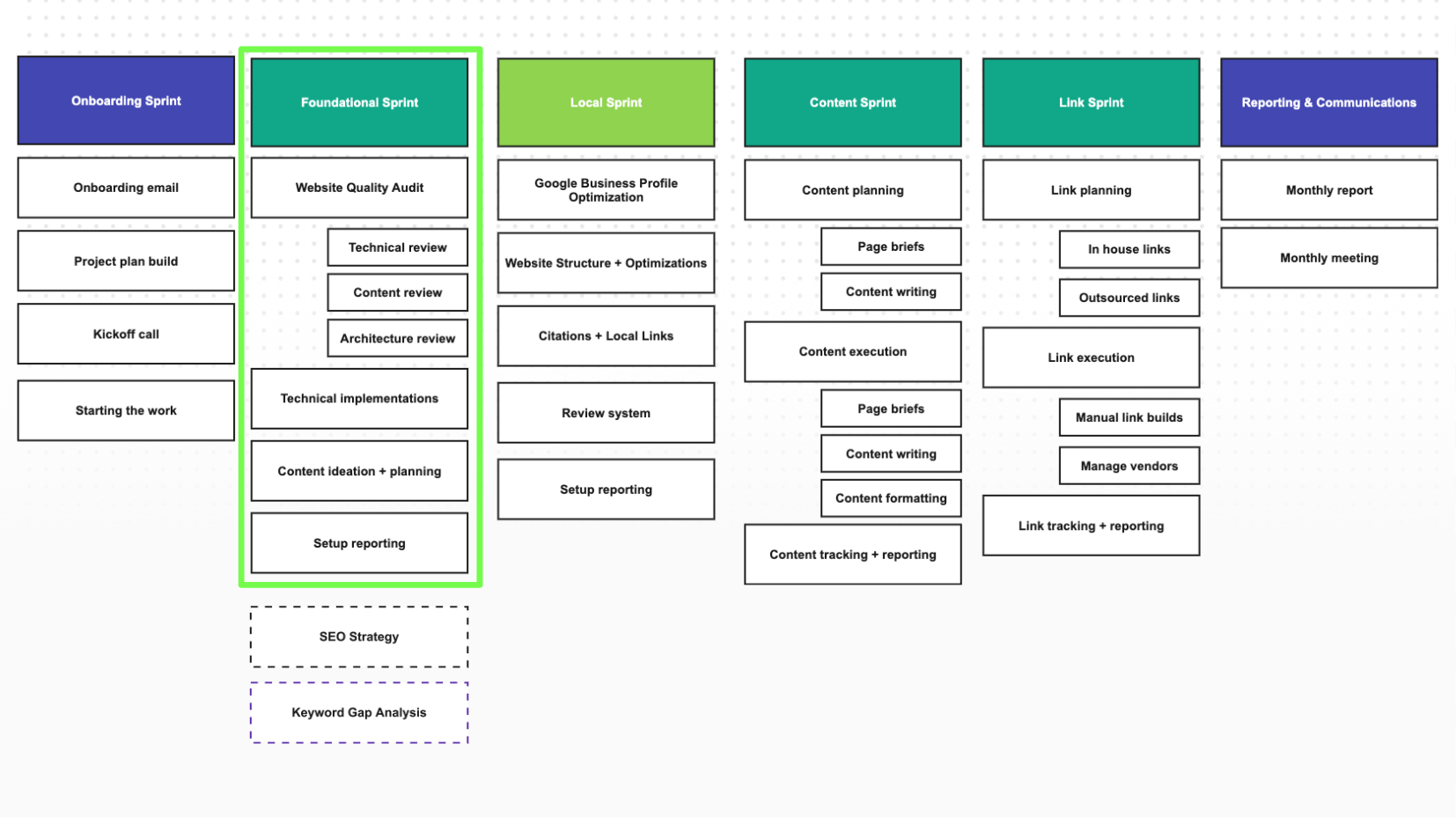
Partnering with an SEO Expert for Marine Industry Growth
SEO is a long-term game that requires consistent effort. By partnering with an SEO agency specializing in marine businesses with a built-out strategy like our Bleneded Customer Generation Strategy, you gain access to:
- Data-driven strategies tailored to your industry.
- Technical expertise to optimize your website.
- Content creation and promotion services.
- Regular reporting to track growth and ROI.
A case study from Search Engine Journal found that businesses working with specialized SEO agencies experienced a 2.8x increase in organic traffic within a year.
- Keyword Optimization: Agencies refine your keyword strategy for maximum impact.
- Conversion Tracking: Detailed analytics help measure the ROI of SEO efforts.
- Content Calendars: Maintain consistency with planned content schedules.
- Competitive Edge: Stay ahead by adapting to Google’s algorithm updates.
- Scalable Growth: Agencies can scale efforts to match your business expansion.
Ready to rank 1st in Google and grow your marine business? Contact Aquatic SEO today and let our experts help you chart a course to success.











